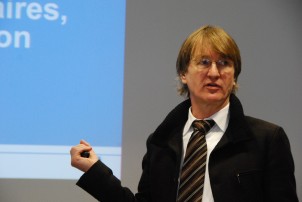Can the healthy choice be the easy choice?
Prof Wolfgang Ahrens, Coordinator of I Family asks…
The living environment, social conditions, economic pressures and the corresponding lifestyle of families have changed enormously over recent decades. Often both parents are working and the time spent together with their children is limited. Self-prepared meals from local ingredients made according to traditional recipes are replaced by fast and ready-made foods. How can I Family contribute to making the healthy choice the easy choice?
Concerns about safety on the streets combined with limited availability of supervised play spaces means parents are reluctant to encourage outdoor play or independent commuting to school. Children and adolescents are exposed to TV programmes 24/7 and spend increasing time playing computer games, partly simulating movement and speed while actually sitting still. All this happens at the expense of their physical activity.
These changes profoundly impact children’s health, particularly those in the most vulnerable groups in our society. More and more are obese, experience metabolic disorders and are affected by psychological problems. Many of these disorders track into adulthood making heavy demands on our health and social care budgets.
Action is clearly needed, but the truth is there is no simple solution to this problem. There are complex factors at play and the interplay between them is often tricky to unravel. Through the I Family study, we are investigating the mechanisms by which environmental factors, lifestyle behaviours and the intrinsic characteristics of individuals act together in the development of children’s health problems.
Only a better understanding of the complex interplay of these factors will enable us to take the necessary action across Europe to support optimal health in childhood and into and throughout adulthood.
I Family is unique as it builds on an existing cohort of more than 16,000 children below the age of ten from eight European countries. These children were voluntarily examined five years ago when they provided details about their diet, lifestyle and physical activity behaviour. Now these children are being examined again so we can assess how healthy they are at present, together with their siblings and parents.
This new assessment will allow us to track how these children have developed, which groups/individuals did particularly well and which did not. By comparing these groups of children, we expect to identify factors that are particularly important for healthy development.
With this new knowledge, our aim in I Family is to contribute to the effectiveness of policies and interventions that will improve living conditions in our societies, and deliver an environment for children and adults that does make the healthy choice the easy choice.”
Prof. Dr. Wolfgang Ahrens is professor for epidemiological methods at UNIHB. His research activities centre on the aetiology of cancer, focusing on environmental factors and occupational exposures, and the research to the aetiology of lifestyle related disorders as well as to primary prevention and evaluation.
First Posted: 29 June 2012








